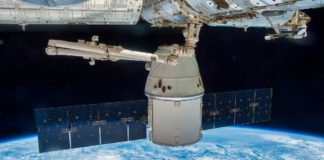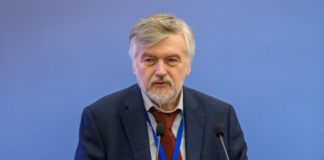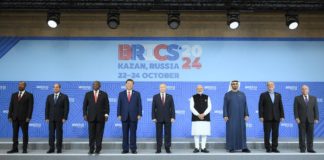The BRICS summit in Kazan will be held on October 22–24. Many experts call it a financial summit, since one of the key issues will be the creation of an independent settlement system among the BRICS countries. Three points are devoted to that problem in the priorities of the Russian Federation’s presidency of the association: increasing the role of the BRICS states in the international monetary and financial system, developing interbank cooperation, promoting the transformation of the international settlement system, expanding the use of national currencies of the BRICS states in mutual trade, strengthening cooperation on the use of payment systems and financial technologies. Of course, the association has many more goals, but this is one of the most pressing ones, creating obstacles to development here and now. Economists from Russia and China discussed this and other problems at the XII Chinese-Russian Economic Dialogue «World Integration Trends: Instruments of Monetary, Financial and Economic Interaction».
The organizers of the 12th China-Russia Economic Dialogue were the Chongyang Institute for Financial Studies of the Renmin University of China (RDCY), the VEO of Russia, the International Union of Economists (IUE), the Expert and Business Council of the IUE and the VEO of Russia on the development of Russian-Chinese cooperation, and the Witte Institute of New Industrial Development (INID).
The Main Obstacle
Over the past two years, Russia has generally reoriented its trade flows to the global South. Trade turnover with most friendly countries in the southern and southeastern directions has grown by tens of percent, often several times. 2024 may set new highs. One of the main barriers that prevents further growth is the complexity of payments.
To achieve the goals aimed at creating a multipolar world, it is necessary to solve the problems associated with the interference of the United States and Western countries, with the obstacles they are building, says Zhou Liqun, President of the Chinese Chamber of Commerce in Russia, Vice President of the Chinese-Russian Society «Friendship». «We see broad prospects for cooperation in the field of creating joint ventures, and in the field of investment, and in other sectors of economic interaction. The share of settlements in national currencies is constantly growing. In such large financial centers as Moscow, Hong Kong, and other cities in our countries, capital is accumulating, which in the future, in the form of assets, will stimulate the development of our economies,» the Chinese economist noted. Russia and China should, on the basis of basic intergovernmental agreements, increase the volume of trade transactions using national currencies, an improved system of settlements, clearing, and intensify this work in the BRICS format, believes Da Wei, director of the Center for International Security and Strategy, professor of the Department of International Relations at the School of Social Sciences at Tsinghua University.
Albert Bakhtizin, Director of the Central Economics and Mathematics Institute of the Russian Academy of Sciences and Corresponding Member of the Russian Academy of Sciences, said that the United States itself has launched the Atlantic Council project to monitor the dominance of the dollar, where they publish information on the transition of countries to settlements using sovereign currencies. In particular, following China and Russia, Brazil and India have also outlined their position on limiting the unfavorable monetary policy of the United States. As a result, the share of the dollar has decreased from over 70 percent to 58 percent. Moreover, the share of the dollar in world reserves has been decreasing 10 times faster since 2022 than the average over the past two decades.
«I would also like to draw attention to the high volatility of the ruble. More than three times over 23 years, while the euro, on the contrary, has revalued against the dollar, just like the yuan. Such jumps and fluctuations are unacceptable, when the dollar first costs 50, then 130, then decreases again. All this greatly destabilizes both settlements between countries and investors’ confidence in sound long-term policy,” believes Albert Bakhtizin.
New principles
The main objective of monetary policy in new integration associations should not be inflation targeting, as in Russia and other countries peripheral to the West, but stimulating investment activity, says Academician Sergei Glazyev, member of the Board of Ministers for Integration and Macroeconomics of the Russian Economic Commission, Vice President of the VEO of Russia. According to the economist, the main point of monetary policy is to stimulate investment, and this has been brilliantly implemented in China.
Academician Glazyev formulated the main objectives of economic policy. These are the harmonization of interests and the creation of conditions for increasing innovation; control over the price structure; prevention of speculation; active industrial policy; powerful use of development institutions that receive direct state support to stimulate investment; consideration of workers’ rights and accelerated wage growth, ensuring fair wages; careful attitude to nature, creation of a system of strict control over environmental pollution, with the targeted use of payments for environmental pollution for the purpose of cleaning it up; in general, the orientation of the entire system of public administration towards economic development.
«This is the essence, one might say, of the Beijing Consensus, or, as we say, the system of administration in the new world economic order, which ensures accelerated economic growth,» the academician concluded.
What could the new settlement system be like?
The BRICS countries have come up with an initiative to create a grain exchange. This will be the first experience of a system independent from the West. According to Sergei Ryabukhin, First Deputy Chairman of the Committee of the Federation Council of the Federal Assembly of the Russian Federation on Budget and Financial Markets, Vice President of the VEO of Russia, the exchange will in practice allow the implementation of the multi-commodity index project if it is expanded to other dual goods: liquefied gas, gold, silver, tin, copper, lithium, rare earth metals.
«Russian scientists from the Research Institute of Innovative Financial Instruments and Technologies of the Plekhanov University, of which I am the director, on behalf of the Security Council of the Russian Federation, have developed a prototype of financial instruments backed by raw dual goods, currencies of friendly states and other assets using algorithms for constructing price stability indices. The indices are created on a group of dual goods with an anchor in the form of gold or copper and supranational currencies with an anchor in the form of IMF reserve currencies,” said Sergey Ryabukhin.
The meeting participants were presented with a project of a decentralized monetary system UNIT with a payment coin UNT. According to the head of the project, Alexey Subbotin, from the point of view of economic theory, the UNIT concept solves the problem of sovereign financial policy and allows avoiding the risks of the international currency of one state. At the same time, the system claims to service the turnover in world trade, regardless of the currency used by the counterparties.
“With the approach that UNT is formed from 40% of gold and 60% of soft currencies of the BRICS countries, the payment unit has demonstrated greater stability over 10 years than the US dollar. Our goal is not to propose a new payment center, but to create broader approaches, to begin forming a new global financial infrastructure, starting with the use of UNIT for accounting purposes, and subsequently for making payments, but this requires the consent of regulators, and we are actively working with regulators in our country,” said Alexey Subbotin.
The project developers propose using UNIT to determine the value of resources of the future Eurasian Commodity Exchange, where Russian coal, grain, cellulose and other resources will be sold for UNT coins. “From our point of view, this is an ideal solution, since sales for rubles are complicated by the fact that our counterparties in other countries do not have access to rubles, and, in addition, the Russian market itself, for certain reasons, is a rather volatile currency,” the speaker explained.
The head of the Russian-Chinese Dialogue, Academician Glazyev, called on key experts — participants in the meeting — to prepare a draft of recommendations that could be used in discussions both at the forum in Kazan and at other venues within the BRICS framework.
Author: Konstantin Markelov



